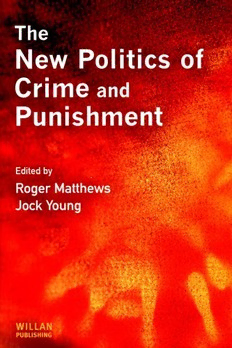
New Politics of Crime and Punishment PDF
Preview New Politics of Crime and Punishment
The New Politics of Crime and Punishment . The New Politics of Crime and Punishment edited by Roger Matthews Jock Young WillanPublishing CulmcottHouse MillStreet,Uffculme Cullompton,Devon EX153AT,UK Tel:(cid:1)44(0)1884840337 Fax:(cid:1)44(0)1884840251 e-mail:info(cid:1)willanpublishing.co.uk Website:(cid:1)www.willanpublishing.co.uk PublishedsimultaneouslyintheUSAandCanadaby WillanPublishing c/oISBS,5824N.E.HassaloSt, Portland,Oregon97213-3644,USA Tel:(cid:1)001(0)5032873093 Fax:(cid:1)001(0)5032808832 Website:www.isbs.com (cid:2)theEditorsandContributors Allrightsreserved;nopartofthispublicationmaybereproduced,storedinaretrieval system,ortransmittedinanyformorbyanymeans,electronic,mechanical, photocopying,recordingorotherwisewithoutthepriorwrittenpermissionofthe PublishersoralicencepermittingcopyingintheUKissuedbytheCopyrightLicensing AgencyLtd,90TottenhamCourtRoad,LondonW1P9HE. Firstpublished2003 ISBN1-903240-92-1(hardback) ISBN1-903240-91-3(paperback) BritishLibraryCataloguing-in-PublicationData AcataloguerecordforthisbookisavailablefromtheBritishLibrary TypesetbyTWTypesetting,Plymouth,Devon PrintedandboundbyTJInternationalLtd,TrecerusIndustrialEstate,Padstow,Cornwall Contents Editors’ Preface vii About the contributors ix 1 New Labour, crime control and social exclusion Jock Young and Roger Matthews 1 2 Winning the fight against crime? New Labour, populism and lost opportunities Jock Young 33 3 Institutional racism in policing: the Macpherson report and its consequences John Lea 48 4 Youth justice in England and Wales John Pitts 71 5 It’s the family, stupid: continuities and reinterpretations of the dysfunctional family as the cause of crime in three political periods Jayne Mooney 100 6 Drugs: the great cannabis debate Catriona Woolner and Betsy Thom 111 v TheNewPoliticsof Crimeand Punishment 7 Urban regeneration and crime reduction: contradictions and dilemmas Lynn Hancock 129 8 The politics of policing: managerialism, modernization and performance Denise Martin 154 9 Of crowds, crimes and carnivals Patrick Slaughter 178 10 Probation into the millennium: the punishing service? Anthony Goodman 199 11 Rethinking penal policy: towards a systems approach Roger Matthews 223 Index 250 vi Editors’ Preface The political climate in theUnited Kingdomhas changed dramatically over the past decade, and the expectation has been that this would result in a significant shift in government policy on crime and punishment.Thisexpectationhasinpartbeenmet,althoughthenature of the changes which have taken place are not always those that were expected. WhenNewLabourswepttopowerin1997itwaswidelyanticipated thatthiswouldleadto a less punitive,moreinformaland community- based approach, which would place greater emphasis on crime preventionandaddressingthecauses ofcrime,particularlysince there was growing evidence of a decrease in most forms of crime. The popular slogan ‘tough on crime, tough on the causes of crime’, which wascoinedbyTonyBlair,signalledhisdesiretomakeNewLabourthe party of ‘law and order’ and his commitment to take crime seriously, because he believed that this issue was a priority for the electorate. During the first period of administration there was a predictable emphasis on youn g people, who increasingly came to be seen as responsible for a disproportionate amount of crime. There was also a growingfocus on the protectionof victims as well as the development of inter-agency partnerships and ‘evidence-based’ policy. There was a clear commitment to increasing police numbers and to addressing growing concerns about police effectiveness, particularly following the publication of the Macpherson Inquiry and claims about institu- tionalracism. At thesame time, the continuingincreasein the number of people imprisoned led many critics to claim that New Labour had in fact adopted a largely Conservative agenda, and that in their vii TheNewPoliticsof Crimeand Punishment attempt ‘to get tough on crime’ they had moved increasingly to the right. Inthefirstfewyearsofthenewcentury,however,theassessmentof government policy has become more diverse and more positive. The passing of the Crime and Disorder Act (1998) has increasingly been identified as a watershed in policy, by its linking of crime with disorder and its placing them both within a broader framework of community safety. This, in turn, has broadened the focus from crime control to issues of social and distributive justice. It has also involved a realignment of the major regulatory agencies, with responsibility for crime control and community safety shifting increasingly to local authorities. Within this changing context, crime and disorder are increasingly linked to issues of urban decline and regeneration. This broadening of the focus of intervention has resulted in a growing interest in the dynamics of social inclusion and exclusion. The main objective of this book is to examine these developments and to assess their significance. In doing so the authors are faced with theperennialtaskofdistinguishingrhetoricfromrealityandappearan- cesfromunderlyingprocesses.Acursoryexaminationofrecentpolicy, however, indicates that the Labour government is no longer offering ‘more of the same’ and simply trying to outdo its Conservative predecessors.Infact,thereis agrowingrealizationthatNewLabouris now moving in a different direction, involving different priorities, methodsand objectives.A morecomplex and differentiatedstrategyis emerging, which no longer simply mimics ‘get tough’ policies, but which is in the process of developing a more diverse approach, which will undoubtedly have profound consequences not only on ‘law and order’ but also on social life in this country in general. All of the contributors to this volume have a close association with Middlesex University. The criminology group at Middlesex have regularlycontributedoverthepasttwodecadestotheongoingdebates on the politics of crime and punishment, and have attempted to contribute to the development of policy. It is also 30 years since the MastersProgrammein CriminologywasintroducedatMiddlesex,and anumberofthosewhohavestudiedonthispioneeringcoursearenow involvedindevelopingandimplementingthepoliciesdiscussedinthis volume. viii About the contributors AnthonyGoodmanisaPrincipalLectureratMiddlesexUniversity.He has extensive experience of probation practice and teaching, and a specialinterestinthechangingnatureofprobationpractice,whichwas the subject of his doctorate. He is currently researching the effect of parenting programmes on young offenders. Lynn Hancock is Lecturer in Criminology and Criminal Justice at the OpenUniversity.ShewasSeniorLecturerinCriminologyatMiddlesex University1997–2002,andLecturerinCriminologyatKeeleUniversity, 1993–96. She held a Leverhulme Special Research Fellowship between 1996 and 1998 at Keele University and Middlesex Universitiesrespect- ively.Theresearchentitled‘NeighbourhoodChange,CrimeandUrban Policy’ was published in her book Community, Crime and Disorder: Safety and Regeneration in Urban Neighbourhoods (Palgrave, 2001). Her current research interests focus on urban/neighbourhood change and crime, community responses to crime and disorder, and public attitudes towards criminal justice. John Lea is Professor of Criminology at Middlesex University. He is author (with Jock Young) of What Is to Be Done about Law and Order (PlutoPress,1993).Hehaspublishedonissuessuchaspostmodernism incriminologyandsracismincriminaljusticeagencies.Hismostrecent book is Crime and Modernity (Sage, 2002). Denise Martin is a doctoralstudent at Middlesex University research- ing Best Value in the Police Service. She previously worked as a ix
